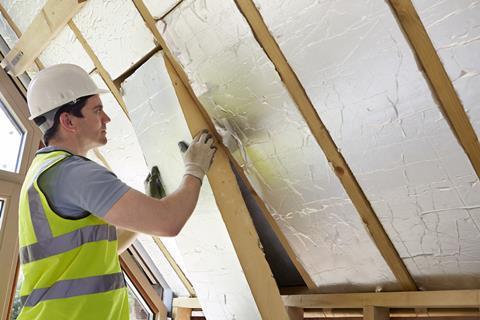Business secretary admitted the scrapped ┬Ż2bn programme had been ŌĆśproblematicŌĆÖ
The government is in talks to reboot its failed retrofit programme for energy efficiency improvements to homes, the minister in charge of it has said.
Business secretary Kwasi Kwarteng admitted that the ┬Ż2bn Green Homes Grant, which was scrapped in March, had been ŌĆ£problematicŌĆØ.
But he said that he was in talks with the chancellor to bring back an ŌĆ£equivalentŌĆØ plan to encourage owner occupiers to decarbonise their homes.
In April, a senior figure in the Construction Leadership CouncilŌĆÖs (CLC) net zero team told a ║├╔½Ž╚╔·TV webinar that Kwarteng had told the CLC that he expected a replacement for the Green Homes Grant to be announced at the next spending review.
The programme has been widely criticised for its chaotic implementation, poor administration and financial impact on many builders and installers.
Launched at the end of September 2020, included ┬Ż1.5bn for householders but just ┬Ż71m of the money had been spent by 22 January.

Speaking on the BBCŌĆÖs Today programme this morning, Kwarteng said that other parts of the programme aimed at improving the energy efficiency of public sector buildings and social housing had worked well.
But he admitted that installers had not had enough time to get accredited to supply owner occupiers who wanted to use the scheme.
Kwarteng also claimed that the price of heat pumps, green heating devices which the government wants installed in buildings to replace gas boilers, could be halved.
He said that Octopus, an energy supplier, had told him the price of heat pumps could ŌĆ£very quicklyŌĆØ come down to as low as ┬Ż5000.
The systems can cost more than ┬Ż10,000, although the Department of Business, Energy and Industrial Strategy admitted in May that the price of ground source heat pumps, which extract heat from the ground, can be up to ┬Ż35,000.
Kwarteng added that the costs will start to fall once the government has made a ŌĆ£very clear indicationŌĆØ that it plans to support heat pumps, encouraging suppliers to invest in their production.
But heat pumps have also proved controversial because of their size, the cost of running them, the disruption they cause during installation, the noise which they can make and the slow speed at which they generate heat.
Conservative backbench MP John Redwood said that the government needs to work with industry to ŌĆ£come up with solutions that people want to adoptŌĆØ.
Redwood said: ŌĆ£YouŌĆÖre only going to get millions of people finding the money and putting a heat pump on their Christmas list if itŌĆÖs affordable, or if itŌĆÖs better or if it makes senseŌĆØ.
ŌĆ£I would urge the government to work with the industry to come up with something which is better and preferably cheaperŌĆØ.
Brian Berry, Federation of Master Builders chief executive, said today that heat pumps ŌĆ£wonŌĆÖt deliverŌĆØ and that the technology will need to advance before they can be considered a viable solution to decarbonising homes.
But representatives from the heat pump industry have accused the government of failing to give the systems the backing required to generate confidence among manufacturers to scale up production and bring down costs.
The governmentŌĆÖs plan for decarbonising buildings is set to be outlined in its long-delayed heat and building strategy, which is expected to be published this autumn.


























No comments yet